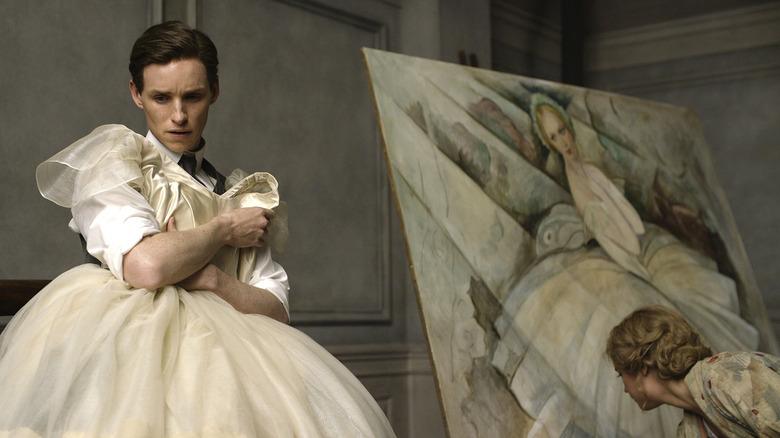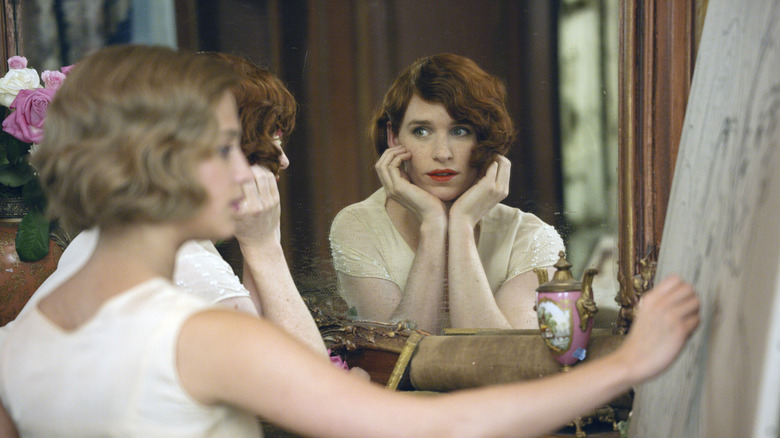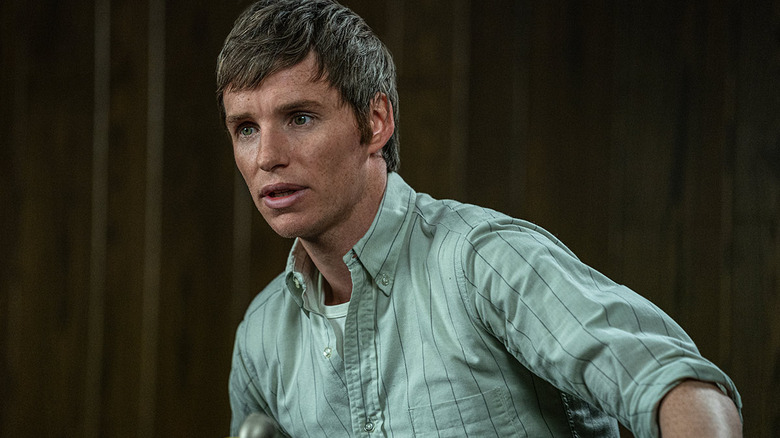Eddie Redmayne Now Thinks That The Danish Girl Should Have Starred A Trans Actress
Six years after the release of Tom Hooper's "The Danish Girl," a biopic about the life of Danish artist and trans woman Lili Elbe, star Eddie Redmayne says that he thinks accepting the role was a "mistake," in response to the criticism that Lili should have been played by a trans actress instead.
In a new interview with The Times in London in preparation for his stint as the emcee in "Cabaret," Redmayne finally admitted that accepting the lead in "The Danish Girl" was a bad move. Asked if he would take on the role of Lili Elbe if he was offered it today, Redmayne said:
"No, I wouldn't take it on now. I made that film with the best intentions, but I think it was a mistake. The bigger discussion about the frustrations around casting is because many people don't have a chair at the table. There must be a leveling, otherwise we are going to carry on having these debates."
While I'm glad that Redmayne has now, six years later, realized he messed up by taking the role, it's admittedly frustrating considering trans people had already told Redmayne this was an issue once his casting had been announced. Of course, people should be allowed the space to recognize the error of their ways and enact positive change, but actions speak louder than words. It's a lot harder to believe genuine change has occurred when the checks have already been cashed and the award season campaigns have already completed. The likelihood is that after all of the nonsense following transphobic comments by "boy wizard writer who-shall-not-be-named," Redmayne has been doing some serious soul-searching and finally understands what activists have been telling him for years.
The Issues with The Danish Girl
Eddie Redmayne took on the role as Lili Elbe in "The Danish Girl," playing a real-life person who was one of the first recipients of gender affirming surgery. The film was a fictionalized retelling of one of history's most groundbreaking transgender women, reducing her life to nothing more than a hill from which to mine trauma porn. There are countless articles (that I will not link to because they don't deserve the traffic) about Eddie Redmayne's "unbelievable transformation" for "The Danish Girl," proving that society is far more interested in what they view as the "act" of transitioning, rather than the actual person experiencing transition.
It also, as the incomparable Jen Richards says in the Netflix documentary "Disclosure," directly correlates to real life violence:
"Part of the reason that men end up killing, out of fear that other men will think that they're gay for having been with trans women, is that the friends –- the men whose judgement they fear of -– only know trans women from media, and the people playing trans women are the men that they know. This doesn't happen when a trans woman plays a trans woman. When you see these women off-screen still as women, it completely deflates this idea that they're somehow men in disguise."
Redmayne's interview was published the day after Transgender Day of Remembrance. 2021 was the deadliest year for transgender individuals on record (per HRC) — and the records are stifled by misidentification as well those who die by suicide due to the overwhelming transphobia experienced.
It's Not Just About Acting
The response to Redmayne's comments regarding "The Danish Girl" have been mixed. Many are thrilled that he's finally realized his mistake, but there is, unfortunately, an overwhelming amount of people filling up comment sections on articles and on social media ignorantly believing his comments are the latest victim of the dreaded cAnCeL CuLtUrE. 'Why wasn't he this outspoken about casting real wizards in 'Fantastic Beasts' or having motor neurone disease as Stephen Hawking?" ask many snarks on Twitter who, again, I'm not linking to because they don't deserve the attention.
These new comments regarding his role in "The Danish Girl" have also resurfaced concerns about ableism in his Academy Award-winning performance in "The Theory of Everything." Entertainment journalist and disability activist Kristen Lopez has talked at length about the issues of casting able-bodied actors in roles for disabled people, including a criticism of "The Theory of Everything" that posits Felicity Jones as Hawking's wife is meant to be seen as an "able-bodied buffer," as a means to help the audience "relate to the bizarre, unknowable disabled."
So, yes, snarky online commenters, Redmayne should also be talking about the problematic complications of playing that role. The reality is that transgender actors and disabled actors are offered little opportunities to tell their own stories, and until marginalized people are the ones allowed to be telling marginalized stories, cisgender and able-bodied actors/producers/directors need to learn how to be equitable.
Growth, Change, and Accountability
There are plenty, however, who have praised Redmayne for his publicly going on record and admit his wrongdoing for playing a transwoman, something that we've not gotten from a number of cisgender men who have been awarded for playing transwomen. While "The Danish Girl" was only released six years ago, the landscape of conversation and easily available education surrounding transgender issues has dramatically changed in the last few years. Admittedly, /Film also contributed to the "Eddie Redmayne is Fine To Play Trans" discourse six years ago, and it's important that we acknowledge the role we played.
If "The Danish Girl" were to come out today, there would be much different coverage regarding the film than what was predominately offered six years ago. This new perspective for Redmayne and for any others that have changed their tune in the last six years owe it the tireless work of transgender activists, educators, and individuals who have been doing the heavy lifting after all of this time. It's important to recognize when progress has been made, but there's still so much further to go. Redmayne's admittance is a huge step in the right direction, and we can only hope that the rest of Hollywood sees him leading by example and stops this ridiculous trend of turning transgender trauma into tear-jerking entertainment for cisgender audiences.



